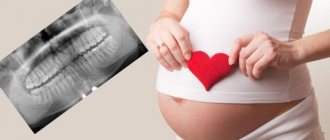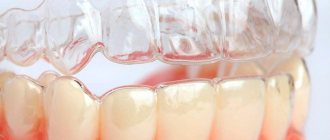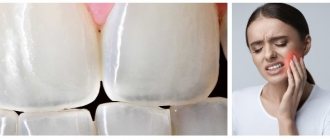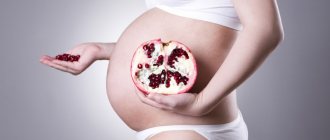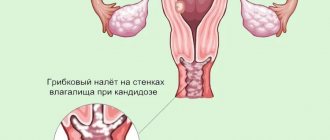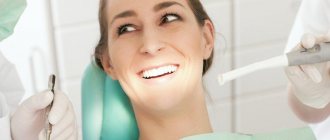Author of the article:
Soldatova Lyudmila Nikolaevna
Candidate of Medical Sciences, Professor of the Department of Clinical Dentistry of the St. Petersburg Medical and Social Institute, Chief Physician of the Alfa-Dent Dental Clinic, St. Petersburg
Pregnancy is both a difficult and wonderful moment in the life of any woman. All the body’s forces are aimed at bearing the fetus, which inevitably leads to hormonal changes. Today we will talk about one of the most pressing problems of women expecting a baby – oral care. What mouthwash should you choose during pregnancy to protect your teeth and gums and not harm your baby? Let's figure it out.
Does pregnancy affect the condition of the gums?
Undoubtedly. One of the main features of the waiting period is the woman’s increased need for vitamins, fluoride, iron, magnesium, as well as phosphorus-calcium complexes. The body becomes more vulnerable and weakened: during pregnancy, many women begin to develop signs of periodontitis for the first time, teeth are rapidly destroyed, and the prevalence of caries increases exponentially.
Problems with teeth and gums during pregnancy indicate a deficiency of nutrients in the mother's body. Often, a woman’s diet at this time lacks calcium, phosphorus, fluorine and other elements, which inevitably leads to the development of caries. To avoid this problem, from the first trimester of pregnancy you should be careful about your diet, add phosphorus-calcium complexes, vitamins (especially A, D, C).
Changed hormonal levels also affect the gums. The most common tissue problems during pregnancy are:
- Inflammation of the gums or gingivitis
. As a rule, a woman experiences swelling of the gums, redness of the tissues, as well as bleeding and pain when brushing her teeth. There is also a high risk of developing hypertrophic gingivitis or gum swelling. In severe forms of the disease, swollen tissue covers more than half of the tooth crown. - Bleeding gums
. The tissues bleed several times a day, and the volume of discharge increases when the gums are exposed to food (chewing) or a toothbrush. - Gum receding
. This very unpleasant phenomenon happens if a pregnant woman uses an overly hard brush and puts excessive pressure on her gums while brushing. Such pockets also appear after advanced gingivitis and periodontitis. - Itching
. The feeling that the gums are constantly itching can be caused by various diseases - for example, ulcerative, catarrhal, hypertrophic gingivitis, periodontitis, stomatitis, candidiasis, allergies, ARVI or influenza. - Pus in the gums.
Separation of pus from the oral cavity is observed with ulcerative gingivitis and periodontitis in the acute stage. With periodontitis, fistulas may also appear on the tissues, as a result of advanced caries or poorly healed canals.
Can rinse aids be used?
According to dentists, during pregnancy it is permissible to use mouth rinses with extracts of medicinal herbs and medications. The components of these drugs act at the local level and do not enter the general bloodstream.
Doctors also advise giving preference to non-alcoholic rinses during pregnancy, since such products do not pose a danger due to the adverse effects of alcohol on the mucous membranes. Non-alcoholic products are ideal as a preventive measure and will help avoid gum problems in the future.
As a rule, for inflammation of the gums, on the recommendation of the dentist, the following types of rinses are used during pregnancy:
- Fluoride-containing
- when the balance of the bacterial flora of the oral cavity is disturbed. - Herbal
– for minor inflammations. - Cetylpyridinium chloride products
are necessary to treat and stop the growth of plaque. These rinses are also used for severe inflammatory reactions. - Rinses with antiseptics
should be used short-term, no longer than 30 days (1 month). Such drugs are prescribed in difficult dental situations, with severe suppuration and abscess formation. - Desensitizing agents are recommended for use in case of increased sensitivity of teeth and gums
Oak bark in cosmetology
In conclusion, we would like to introduce you to a number of simple and effective recipes for maintaining beautiful hair and healthy facial skin.
An oak bark mask will help stop hair loss, a fairly common problem during pregnancy. In addition to the main ingredient you will need:
- mint;
- dandelion flowers;
- plantain;
- Burr oil.
Finely chop and mix all dry ingredients. Combine the mixture with a couple of dessert spoons of burdock oil. After the mask has infused, warm it, preferably in a water bath, to room temperature. Rub the resulting mixture into the scalp, distribute along the entire length of the strands. To enhance the effect of the mask, you can tuck your hair under a plastic cap and wrap your head in a towel. After one hour, rinse off the mask with running water and shampoo and rinse your hair with a decoction of oak bark. The result will be more noticeable if you do a similar procedure every day for ten days.
If you have combination and oily skin types, try preparing a mask to eliminate excess oil. Mix a tablespoon of oak bark with the same amount of calendula. Brew the mixture with two glasses of boiling water. When the substance reaches room temperature, soak gauze in it and apply it to your face. The duration of the procedure is 15 minutes. In this form, oak bark is absolutely harmless during pregnancy.
Learn what ketone bodies and ketonuria are.
We recommend reading whether pregnant women can eat strawberries.
Read: what are the benefits and harms of hibiscus during pregnancy.
To refresh your facial skin, prepare a rejuvenating, anti-inflammatory and toning mask. Pour one tablespoon of oak bark with a glass of boiling water and leave for an hour. Then add one teaspoon of honey and olive oil. Apply the mask to your face and leave for 20 minutes.
Oak bark is an invaluable storehouse of beneficial medicinal properties. Literally for pennies you get a natural, effective herbal medicine with a unique composition. However, remember that during pregnancy, the use of any drug, including oak bark, is possible only after consultation with a specialist. Stay healthy and beautiful!
Can I use natural remedies?
As an addition to treating gums with a rinse, pregnant women can use herbal decoctions on the recommendation of their doctor. For inflammation, women are advised to pay attention to the following remedies while expecting a baby:
- decoction of oak bark;
- decoction of lingonberry leaves;
- infusion of chamomile;
- decoction or infusion of calendula flowers;
- sage tea.
An excellent helper for a pregnant woman's gums will be Asepta Fresh mouth rinse with chamomile and witch hazel extract. This product is perfect for daily protection of teeth and gums from plaque, and also preserves the natural whiteness of the enamel, soothes the gums and prevents the occurrence of caries. Asepta Fresh mouth rinse does not contain alcohol, dyes or antiseptics and can be recommended without restrictions on the period of use.
Medicinal properties of the drug
The antiseptic, antimicrobial effect of the bark of this perennial tree is due to the components that make up the plant:
- tannin is an active tannin;
- flavonoids, known for their antioxidant effect;
- starch;
- pectin;
- sugar.
By combining with proteins, tannin forms a kind of protective barrier against pathogenic microorganisms. Therefore, during pregnancy, when a woman’s immune system weakens, treatment with herbal preparations from oak bark comes in handy.
It is actively used for treatment and prevention:
- gastrointestinal diseases;
- diarrhea;
- bleeding caused by hemorrhoids;
- gingivitis;
- pharyngitis;
- tonsillitis;
- halitosis;
- burn injuries;
- skin inflammation;
- excessive sweating;
- candidiasis.
In dentistry and otolaryngology, the drug is mainly used in the form of decoctions and solutions. In gynecology, douching is indicated for candidiasis and cervical erosion.
Important: during pregnancy, douching with a solution of oak bark is permitted only in a doctor’s office.
The plant has virtually no contraindications, so it is used even in pediatrics. For example, a decoction of chamomile, oak bark, and string is added to the bathing water for newborns. Such baths also help a lot with atopic dermatitis in children.
Scope of application of the herbal medicine in pregnant women
Despite such a wide range of uses for oak bark, during pregnancy it narrows significantly. This is due to the risk of side effects. However, when used externally, there is virtually no negative impact.
During pregnancy, rinsing with a decoction of oak bark is considered very effective for gum diseases. It's easy to cook:
- pour a tablespoon of raw material with a glass of just boiled water;
- cook the mixture for about 6-7 minutes;
- strain and cool to a comfortable temperature for rinsing.
The dosage and duration of treatment are prescribed by the attending physician. As a rule, it is recommended to rinse your mouth twice a day for a week.
Attention: a decoction of oak bark can stain teeth yellow during the treatment period.
In ENT practice, rinsing with a decoction of oak bark can also often be found in doctor’s prescriptions during pregnancy. Inflammation of the mucous membrane of the throat and tonsils can be easily relieved by gargling with tincture or decoction of oak bark.
As for gynecology, the use of oak bark is possible only in exceptional cases. Modern medicine has more effective drugs that are safe during pregnancy.
Read: what are the benefits of cranberries during pregnancy?
Every expectant mother should know how dangerous the drug Ketorol can be during pregnancy.
Side effects of oak bark during pregnancy
Most experts tend to believe that during pregnancy, oak bark for external use is safe for fetal development. It is advisable to use it if a woman has allergic reactions to components of other medications. However, individual sensitivity to the active ingredients of oak bark should be excluded.
The instructions for the drug indicate only two side effects that are acceptable both during pregnancy and in normal conditions:
- allergic reactions;
- decreased sense of smell, taste perception subject to long-term treatment with a herbal remedy (mouth rinse).
In view of this, during pregnancy you can purchase oak bark in the pharmacy chain without a prescription from a doctor. Despite this, we strongly do not recommend self-medication. It is better to start taking the herbal medicine after consulting with your doctor.
Clinical researches
Many experts note the high effectiveness of Asepta products. Conducted at the Military Medical Academy named after. CM. Kirov research has shown that products for individual oral hygiene of the Asepta series allow, within 6 months after the completion of complex treatment, not only to improve oral hygiene and reduce inflammatory processes in the gums by 55.37%, but also to reduce number of relapses of localized periodontitis.
To increase the effectiveness of treatment of chronic localized periodontitis of traumatic etiology in young people, it is advisable to include series products in the complex of treatment and preventive measures.
Sources:
- Clinical studies of antisensitive toothpaste “Asepta Sensitive” (A.A. Leontyev, O.V. Kalinina, S.B. Ulitovsky) A.A. LEONTIEV, dentist O.V. KALININA, dentist S.B. ULITOVSKY, Doctor of Medical Sciences, Prof. Department of Therapeutic Dentistry, St. Petersburg State Medical University named after. acad. I.P. Pavlova
- The role of anti-inflammatory rinse in the treatment of periodontal diseases (L.Yu. Orekhova, A.A. Leontyev, S.B. Ulitovsky) L.Yu. OREKHOVA, Doctor of Medical Sciences, Prof., Head of Department; A.A. LEONTIEV, dentist; S.B. ULITOVSKY, Doctor of Medical Sciences, Prof. Department of Therapeutic Dentistry of St. Petersburg State Medical University named after. acad. I. P. Pavlova
- Report on determining/confirming the preventive properties of commercially produced personal oral hygiene products: Asepta toothpaste used in combination with Asepta mouthwash and Asepta gum balm Head. Department of PFS Doctor of Medical Sciences Professor S.B. Ulitovsky St. Petersburg State Medical University named after Academician I.P. Pavlova. Faculty of Dentistry. Department of Preventive Dentistry.
